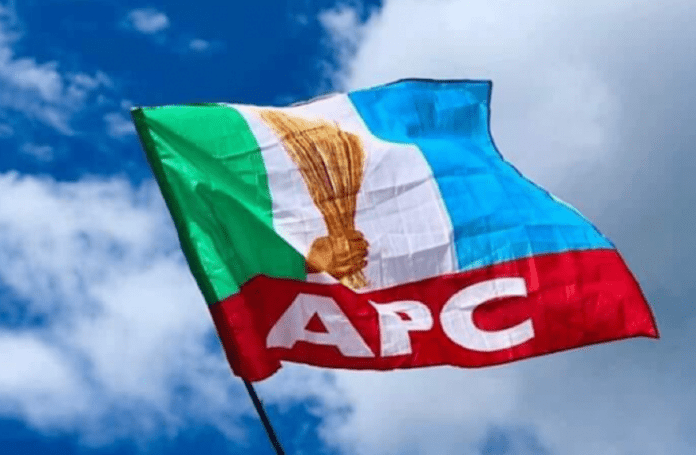Most predictably, the Anambra State chapter of the APC, which came a distant third in the state governorship election of November 6, 2021, did not waste time denigrating the poll as soon as it sensed defeat.
Jolted by the powerful statement of the election trend, Basil Ejidike, State Chairman of the party in Anambra State, in a release, Sunday , November 7, 2021, demanded cancellation of the exercise on alleged ground of malpractice.
Ejidike’s reaction to the verdict of the electorate was one of outburst. In a statement dripping with disappointment and anger, the APC chair declared: “Ndi Anambra want an APC Governor and there’s nothing anyone can do to deny them that opportunity.”
Admitting doubt over it’s capacity to stampede the electoral body to bend to it’s will, the statement threw a lame threat. “But if INEC goes ahead to announce the results, we will definitely challenge the election process at the court.”
Ejidike’s bragging about going to court is no more than an attempted bluff. It’s a move the voters who resolutely took their destiny in their own hands in the election welcome. Let anyone genuinely aggrieved with the election process seek redress. In the same spirit of transparency and fairness, Nigerians are eagerly awaiting the judicial pronouncement as to whether the APC fielded a validly nominated candidate for the Anambra governorship election. Perhaps, the APC chair needs to be reminded that it was his candidate’s counsel who sought deferment of the Federal High Court, Abuja judgement on the matter earlier slated for November 4, 2021.
Although a protest was well within the rights of the APC, yet, the context and manner it was handed down, pointed to other motives.
This particular outcry against the conduct of the election was patently false in the face of the extra ordinary measures put in place to achieve free and fair polls. With an armada of 34, 587 security officers deployed for the election, the scenario was scary for even the most hardened trouble makers. With three helicopters scouring the length of the State, the phalanx of security forces spearheaded by 3 DIGs, 5 AIGs, 14 CPs and 31 DCPs was a tight game. If anyone stood a chance of being favoured by the security machinery, it would be those who made a religion of being part of the centre during the campaign, not an opposition party/government still coping with threats of state of emergency.
The introduction of the Biomodal Voter Authentication System (BVAS) and electronic transmission of results greatly reduced the chances of electoral fraud. BVAS application was so extensive as to limit the actual number of people who eventually voted. The reduced voter count becomes a small price to pay for electoral integrity at this time, with hope that it’s operation will improve subsequently.
The deliberately misleading outcry on the election is to be understood against the backdrop of APC’s disputed governorship primaries. Caught between the glaring contradiction of Andy Uba’s 230, 201 primaries score and the party’s 43, 285 votes in the governorship election, the party’s embarrassment is better imagined. A diversion had to be created from this scandalous setting and scape goat found for self inflicted woes.
Senator Andy Uba’s approach to the governorship poll followed a familiar pattern that characteristically sneers at the concept of popular sovereignty. This palace – style politics is expressed in the ana enwe obodo enwe mentality, literally translated as there are lords who own every community. And so, rather than engage with the mass of citizens, the Uba campaign concentrated on bargaining with perceived game changers. The calculation, which failed disastrously was that once these chieftains gave the political direction in their enclaves, the population would largely obey.
This medieval frame of mind typically failed to reckon with both the lessons of history and the values of democracy.
The creation of a new Anambra State in 1991 was in search of an egalitarian society. A reign of standards in leadership took off with the governorship of Chukwuemeka Ezeife. And from Chinwoke Mbadinuju to Chris Ngige; from Peter Obi to Willie Obiano, it was not just an unwritten rule of educated and accomplished professionals. Each successor took governance and development a notch higher. Why would Ndi Anambra, at this juncture suddenly abandon the path of Soludo’s rich promises for doubtful governorship qualifications?
For a people who had experienced participatory democracy in the past 15 years, the uncertainties of distant government was troubling. Matters were made worse by the combative language of “capture Anambra”; “Imo formula”; and “game over” which heightened the swagger of the actors.
As demonstrated by the viral video of Ebenebe women who refused five thousand naira inducement from an APC agent to vote for the party, democracy and good governance bequeath sense of self esteem.
To further appreciate the prevailing consciousness of the average citizen, witness the trouncing of the Zenith Labour Candidate who, against all counsel, defied the equity of zoning to contest the governorship election. For all the noise made about his resourcefulness, he came sixth with 2082 votes.
The outcome of the Anambra governorship election is a significant a victory for democracy. It’s also a tribute to the African legend, Nelson Mandela who observed that “your (Nigerian) leaders have no respect for their people. You should encourage leaders to emerge who will not confuse public office with sources of making personal wealth.”







